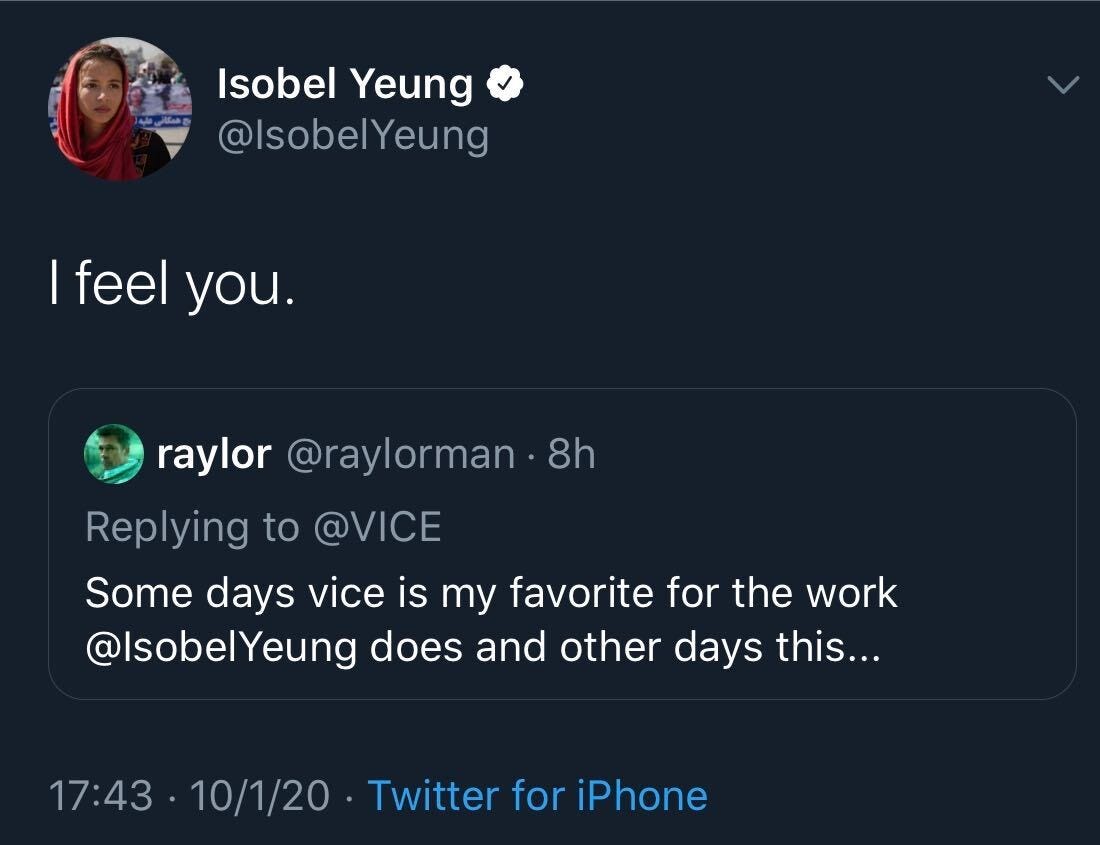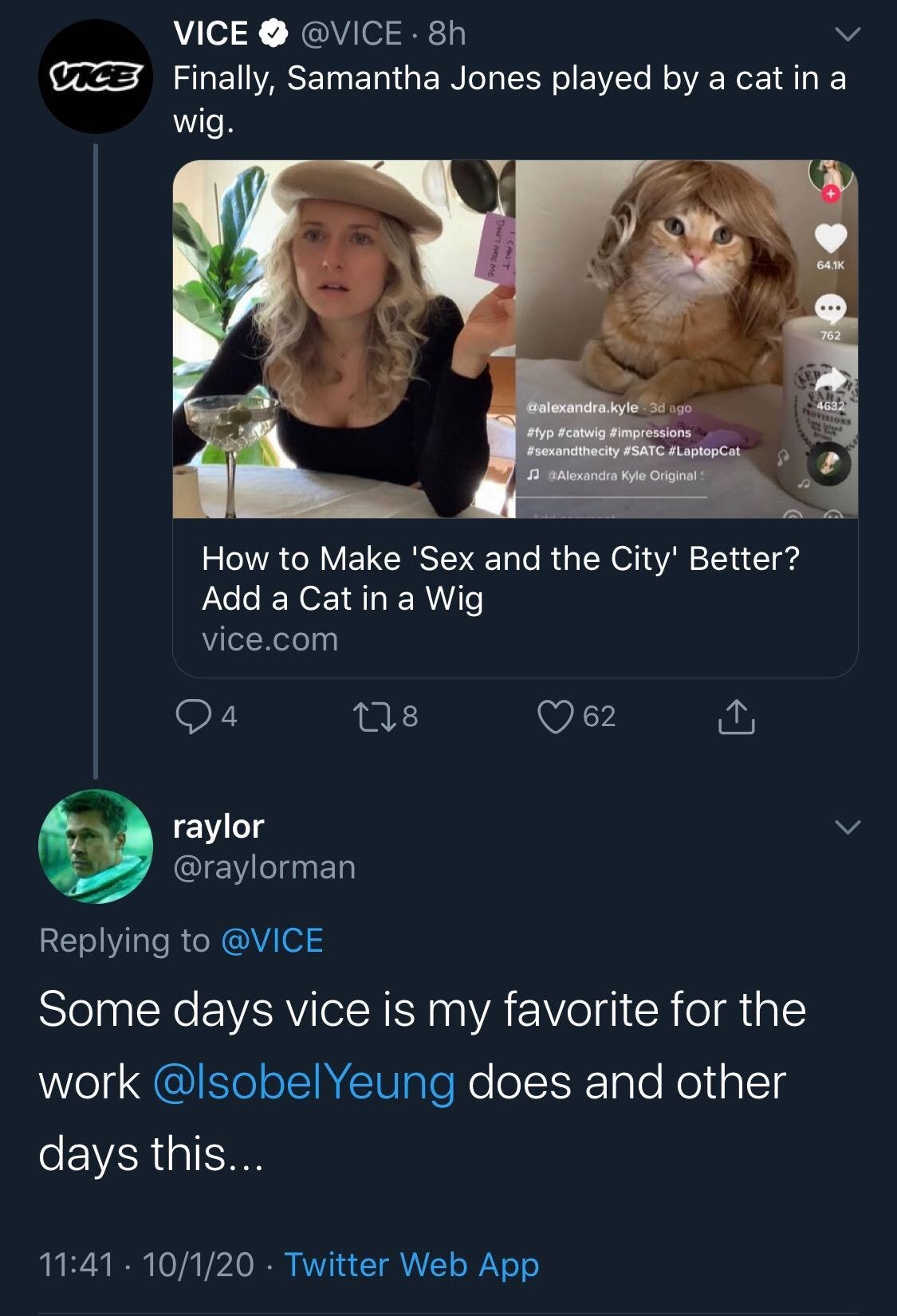You Have to Understand We're All in This Together
There's absolutely no excuse for throwing a colleague under the bus.

On Thursday night, before the news cycle was completely overwhelmed by the president catching coronavirus, Isobel Yeung, a correspondent for Vice News, tweeted the comment pictured above about a story tweeted by Vice’s main social account.
The story in question, an interview with a TikTok creator who went viral recently for re-enacting scenes from Sex and the City in which Samantha was played by her cat in a wig, was written by Bettina Makalintal, a food and culture writer at Vice. It was, in my opinion, a great blog. The cat in the wig is hilarious, the videos are funny, and Makalintal’s interview adds great context to them (the cat is an elderly male named Fred; the wig often falls off his head). But to @raylorman, an anonymous Twitter user whose profile picture is Brad Pitt in that insanely boring space movie from a while back, Makalintal’s piece was a disappointment compared to the standards set by reporters like Yeung, who recently won an Emmy award for her documentary on China’s ethnic cleansing campaign against Uyghur Muslims.

Vice reporters weather this kind of criticism nearly every day, which is lobbed en masse by barely-literate morons who don’t understand how a modern news organization works and who get fully red-assed every time a piece of content they aren’t particularly interested in comes across their feed. But instead of ignoring the criticism, or telling @raylorman to fuck off, Yeung empathized, directly throwing her colleague under the bus and denigrating her work with three mild words of assent: “I feel you.”
I get why Yeung tweeted this. It is frustrating to have the organization you work for defined by content that doesn’t reflect the work that you’re doing, or by past work that doesn’t meet current standards, particularly when you work in an extremely visible, public-facing role. Vice is perhaps one of the largest victims of this, as their early brand was built on content that pushed the established boundaries of taste and decency in order to attract viewers who were traditionally disinterested in mainstream media. This strategy, of course, also alienated many consumers with pretentious views on what journalism should and shouldn’t be, and the legacy of Vice’s early, less scrupulous work often follows the journalists working there on every beat, not just the ones shown on cable.
In fact, many of Yeung’s coworkers can probably empathize with her — it is exhausting to fight for the legitimacy of your work against snobbish gatekeepers who formed their entire opinion of digital media in 2010. Journalists of a certain generation know to expect this from the kind of dusty hacks that populate the mastheads of most legacy publications. But we don’t typically expect it from our peers. To put it plainly, if you’re below the age of 40 in media, you should fucking know better.
You must know how all of this works. BuzzFeed News, one of the most aggressive and incisive news organizations competing on a national level right now, would not exist if the company hadn’t built a juggernaut of ad money on the backs of underpaid or unpaid aspiring creatives churning out quizzes and clickbait to a massive new online audience. Vice is no different — its Emmy-award-winning news organization was built on the proceeds from both the company’s early, incredibly racist foreign correspondence and its blogs about how sugarfree Haribo gummy bears make you shit your brains out.
Yeung’s work, of course, is produced at and held to an exponentially higher standard than Shane Smith’s early forays into laughing at starving Black people in the global south. So, too, is Makalintal’s: a breezy, end-of-week blog about a viral TikTok star is a far cry from the lowest-common-denominator content that nearly every site has relied upon at some point in its history to please the right algorithm and keep the lights on. (If Yeung had done even a single bit of research into the coworker she was denigrating, she would also have found incisive essays on endemic whitewashing in recipe naming conventions and Bon Appetit’s careful curation of its workplace culture.)
Yeung’s flippant, three-word denouncement of this work is therefore stupid on multiple levels. It implies a fellow writer’s work on a different beat is of inferior quality and it belies an outdated unfamiliarity with how her own industry actually works. Yeung owes her career in flashy, hard-hitting conflict journalism to the decade and a half of Vice writers who churned out sometimes-undignified content in often-undignified circumstances in order to attract the viewers and advertisers that made the company a generational brand. Much of that work, it should be said, was good. The aforementioned gummy bear blog is a classic of the genre, a perfectly-paced feat of storytelling with several visceral turns of phrase. And even the stuff that does miss the mark should still be treated with dignity, as it was produced through the labor of young writers who surely would have rather written about something else.
I have no idea how many articles I have written in my career. I remember my first, a puff piece on a new coffee shop for my campus newspaper, and in the decade since then I’ve produced everything from frontline dispatches from active combat zones (for, among other places, Vice) to campaign-trail write-ups on election night. I’ve also written literally hundreds of breathless blogs about moronic carmaker Elon Musk. I did all of these stories, in general, for the same reason: because it was my job, and I wanted to pay rent. I am good at my job, and often I enjoy it, but the content of those stories does not inherently grant value toward the labor it took to perform them. The fact that Vice blogs about a wig-wearing cat does not undermine Isobel Yeung’s Emmy; the fact that I once wrote about a guy whose dick fell off from dick cancer does not make this essay any less important. This is how our industry works. You do what you have to do to keep moving.
After a few hours, Yeung deleted the tweet, in the face of a swift and unsparing backlash. We can only hope that she’ll be better at learning from her coworkers’ generous feedback than she is at reading their work.
Disclosure: Discourse Blog staffer Caitlin Schneider is a social editor at Vice. She was not involved with the planning, writing, or editing of this blog.





See, I thought Caitlin was making the best blogs, and now Jack Crosbie (and Jack Crosbie's moustache) are making awesome blogs as well. I can't decide who is making the best blogs!
All the more reason I am happy to give you monies to keep making blogs. More good blogs please!
All good points, but I refuse to accept the movie where Brad Pitt fights space pirates and baboons is boring